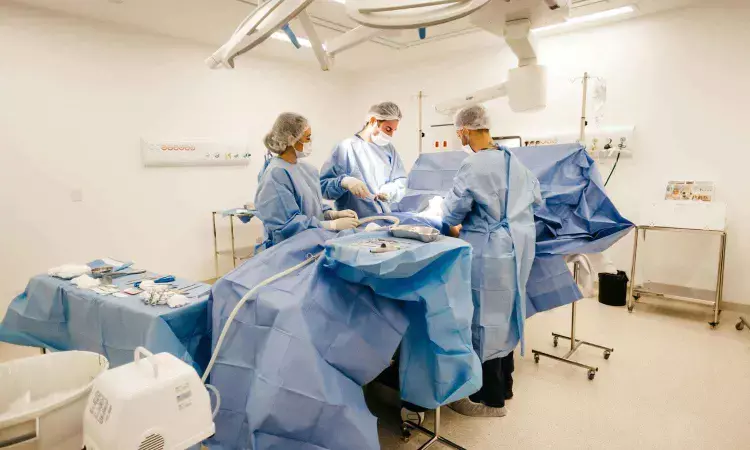- Home
- Medical news & Guidelines
- Anesthesiology
- Cardiology and CTVS
- Critical Care
- Dentistry
- Dermatology
- Diabetes and Endocrinology
- ENT
- Gastroenterology
- Medicine
- Nephrology
- Neurology
- Obstretics-Gynaecology
- Oncology
- Ophthalmology
- Orthopaedics
- Pediatrics-Neonatology
- Psychiatry
- Pulmonology
- Radiology
- Surgery
- Urology
- Laboratory Medicine
- Diet
- Nursing
- Paramedical
- Physiotherapy
- Health news
- Fact Check
- Bone Health Fact Check
- Brain Health Fact Check
- Cancer Related Fact Check
- Child Care Fact Check
- Dental and oral health fact check
- Diabetes and metabolic health fact check
- Diet and Nutrition Fact Check
- Eye and ENT Care Fact Check
- Fitness fact check
- Gut health fact check
- Heart health fact check
- Kidney health fact check
- Medical education fact check
- Men's health fact check
- Respiratory fact check
- Skin and hair care fact check
- Vaccine and Immunization fact check
- Women's health fact check
- AYUSH
- State News
- Andaman and Nicobar Islands
- Andhra Pradesh
- Arunachal Pradesh
- Assam
- Bihar
- Chandigarh
- Chattisgarh
- Dadra and Nagar Haveli
- Daman and Diu
- Delhi
- Goa
- Gujarat
- Haryana
- Himachal Pradesh
- Jammu & Kashmir
- Jharkhand
- Karnataka
- Kerala
- Ladakh
- Lakshadweep
- Madhya Pradesh
- Maharashtra
- Manipur
- Meghalaya
- Mizoram
- Nagaland
- Odisha
- Puducherry
- Punjab
- Rajasthan
- Sikkim
- Tamil Nadu
- Telangana
- Tripura
- Uttar Pradesh
- Uttrakhand
- West Bengal
- Medical Education
- Industry
Older adults with serious illness before surgery use far more health care resources after surgery: Study

Older adults who have serious illness before undergoing elective surgery had hospital stays twice as long as similarly aged counterparts; were twice as likely to return to the hospital or the emergency department; and had almost double the yearly costs of health care, according to a study published in the Journal of the American College of Surgeons.
“We were looking at the palliative care needs of this group of patients to see whether we could identify points to intervene,” said lead study author Jolene Wong Si Min, MD, of the Center for Surgery and Public Health at Brigham and Women’s Hospital in Boston and the National Cancer Center Singapore and Singapore General Hospital. “These needs were high in older adults with serious illness and who were going for major elective surgery.”
The study used data from the Health and Retirement Survey linked to Medicare claims and analyzed data from 2,499 patients aged 66 and older who had major elective surgery between 2007 and 2019.
Key Findings
- 79% of the study population had one of four clinical characteristics indicating a need for palliative care before undergoing elective surgery: moderate to severe pain; depression; functional dependence; and a need for a care partner.
- 63% of this population had serious illness.
- Seriously ill older adults with palliative care needs before surgery had higher rates of total hospital stays compared with patients who did not have serious illness before surgery.
- Adjusted one-year health care costs averaged $38,187 for this population compared with $20,129 for those without serious illness.
The study defined serious illness as any life-limiting condition that affects an individual’s quality of life or causes excessive strain on care partners. Palliative care, according to the authors, focuses on improving the quality of life through the relief of pain and psychological symptoms, addressing functional needs, and providing care partner support, among others.
“Among the four characteristics that we looked at, depression had the highest significance when it comes to having an association with health care utilization and costs,” Dr. Wong said. “If you were to choose any target to treat, it should be depression.”
Patients with serious illness and depression had significantly higher rates of health care utilization than patients without serious illness.
“An important next step would be to see how we can successfully incorporate palliative care practices in the care of seriously ill patients going for routine elective surgery,” Dr. Wong said.
While some health care advocates have held out a model of embedding palliative care specialists with surgical teams, Dr. Wong said the study authors believe training surgeons to be attentive to palliative care needs would be a more practical approach.
“Future research would be in a generalist palliative care model,” Dr. Wong said. “We feel strongly that surgeons should be trained to understand how palliative care applies to surgical practice because these needs are so common.”
Reference:
Min, Jolene Wong Si MD1,2,3; Wang, Yihan PhD4; Bollens-Lund, Evan MA4; Reich, Amanda J PhD, MPH1; Dhanani, Hiba MD1,2; Ankuda, Claire K4; Lipsitz, Stuart ScD1; Gray, Tamryn F PhD, RN, MPH, ScD5,6,7; Ritchie, Christine S MD, MSPH8; Tabata-Kelly, Masami MBA, MA1,9; Cooper, Zara MD, FACS, MSc1,2. Prevalence of Preoperative Palliative Care Needs and Association with Healthcare Use and Cost Among Older Adults Undergoing Major Elective Surgery. Journal of the American College of Surgeons ():10.1097/XCS.0000000000001491, July 16, 2025. | DOI: 10.1097/XCS.0000000000001491
Dr Kamal Kant Kohli-MBBS, DTCD- a chest specialist with more than 30 years of practice and a flair for writing clinical articles, Dr Kamal Kant Kohli joined Medical Dialogues as a Chief Editor of Medical News. Besides writing articles, as an editor, he proofreads and verifies all the medical content published on Medical Dialogues including those coming from journals, studies,medical conferences,guidelines etc. Email: drkohli@medicaldialogues.in. Contact no. 011-43720751


